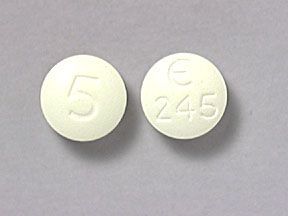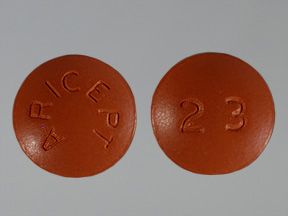The prescribed dosage for Aricept (donepezil) may depend on a person’s individual treatment plan. Factors such as the person’s medical history and condition may affect the dosage of Aricept.
Aricept is a prescription drug used to treat dementia related to mild, moderate, or severe Alzheimer’s disease. (Dementia is sometimes referred to as major neurocognitive disorder.)
Aricept comes in two forms. One is a tablet that is swallowed. The other is a tablet that dissolves on the tongue, which is called an orally disintegrating tablet (ODT).
Both forms contain the active ingredient donepezil. An active ingredient is what makes a drug work. Aricept belongs to a group of drugs called acetylcholinesterase inhibitors.
This article describes the dosages of Aricept, as well as its strengths and how to take it. To learn more about Aricept, including its side effects and uses, see this in-depth Aricept article.
Note: As a person’s condition progresses, they may need help reading or understanding certain information about their treatment plan. This article contains details that may help caregivers learn more about key aspects of Aricept.
The following table highlights the basics of Aricept’s dosage. All doses are listed in milligrams (mg).
The doctor will determine the best dosage for the condition it’s treating. In some cases, they may adjust the dosage from those shown here.
| Severity of Alzheimer’s disease | Starting dosage | Maximum dosage |
|---|---|---|
| mild to moderate | 5 mg once daily | 10 mg once daily |
| moderate to severe | 5 mg once daily | 23 mg once daily |
Note: The doctor likely will prescribe 5 mg daily for 4 to 6 weeks before increasing the dosage. After that time, they’ll likely prescribe 10 mg daily for at least 3 months before increasing the dosage again to 23 mg daily.
Aricept forms and strengths
Aricept comes in two forms. Each is available in various strengths measured in milligrams (mg):
- tablet to swallow:
- 5 mg
- 10 mg
- 23 mg
- orally disintegrating tablet (ODT) that dissolves on the tongue:
- 5 mg
- 10 mg
Aricept is approved to treat dementia related to mild, moderate, or severe Alzheimer’s disease. The doctor will likely start treatment by prescribing a low dosage. Then they’ll adjust it over time to reach the right amount for the condition. They’ll ultimately prescribe the smallest dosage of Aricept that provides the desired effect.
The starting dosage of Aricept for dementia is 5 mg once daily. The starting dosage is the same for both mild to moderate and moderate to severe Alzheimer’s disease.
The maximum dosage for mild to moderate Alzheimer’s disease is 10 mg once daily. The maximum dosage for moderate to severe Alzheimer’s disease is 23 mg once daily. The doctor will determine whether to increase the Aricept dosage. It’s important to take the dosage the doctor prescribes.
The doctor or pharmacist will provide specific instructions for taking Aricept. The typical recommendations for taking Aricept are as follows:
If taking the oral tablet:
- Take Aricept once daily. The best time to take it is right before going to bed for the night.
- Aricept can be taken with or without food.
- It’s important to swallow the tablet whole. Do not crush, split, or chew it.
- This article provides tips for people who have difficulty swallowing pills. Or the doctor might suggest the ODT version of the drug as a better option.
If taking the orally disintegrating tablet (ODT):
- Take Aricept once daily. The best time to take it is right before going to bed for the night.
- Aricept can be taken with or without food.
- The tablet should remain on the tongue until it dissolves. It’s helpful to drink a glass of water after it does dissolve.
How long is Aricept taken?
Aricept is usually a long-term treatment. Discuss with the doctor whether it’s safe and effective for the condition it’s treating. If it is, then it’s likely to be taken long term.
It’s important to not take more Aricept than the doctor prescribes, as doing so could lead to harmful effects.
Symptoms of Aricept overdose
Symptoms caused by an overdose of Aricept can include:
- severe nausea
- severe vomiting
- sweating
- drooling and more saliva than usual
- slow heart rate, which is known as bradycardia
- low blood pressure, which is known as hypotension
- respiratory depression (slowed breathing)
- convulsions
- death (rare but possible if respiratory muscle weakness occurs)
What to do in case of taking too much Aricept
Call the doctor right away if too much Aricept has been taken. You can also call 800-222-1222 to reach America’s Poison Centers or use its online resource. But if severe symptoms are present, immediately call 911 (or the local emergency number). Or go to the nearest emergency room.
What is the max dose of Aricept?
The maximum dose of Aricept is as follows:
- For mild to moderate Alzheimer’s disease: 10 mg
- For moderate to severe Alzheimer’s disease: 23 mg
A dose should be taken only once daily.
When is the best time of day to take Aricept?
It’s best to take Aricept right before going to bed for the night. This will help minimize some possible side effects, such as a slow heart rate. A slow heart rate could cause fainting.
It’s still important to be careful when getting out of bed in the morning while taking this drug.
If Aricept side effects are disturbing sleep, talk with the doctor about the best time to take the dose.
The dosage of Aricept that’s prescribed may depend on a few factors. These include:
- the severity of the condition the drug is treating
- the form of Aricept being taken
- other health conditions
- other drugs being taken
- how the body responds to Aricept
If a dose of Aricept is missed, skip it. Then resume the drug at its usual time the next day. It’s important to not take two doses at one time to make up for a missed dose.
If Aricept is missed for a week or longer, talk with the doctor before resuming the drug. They may recommend taking a lower dose before resuming the usual dose.
For help remembering to take Aricept on time, try using a medication reminder. This can include setting an alarm or downloading a reminder app on a phone.
Disclaimer: Healthline has made every effort to make certain that all information is factually correct, comprehensive, and up to date. However, this article should not be used as a substitute for the knowledge and expertise of a licensed healthcare professional. You should always consult your doctor or another healthcare professional before taking any medication. The drug information contained herein is subject to change and is not intended to cover all possible uses, directions, precautions, warnings, drug interactions, allergic reactions, or adverse effects. The absence of warnings or other information for a given drug does not indicate that the drug or drug combination is safe, effective, or appropriate for all patients or all specific uses.






